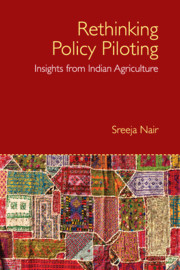Book contents
- Frontmatter
- Contents
- List of Figures and Tables
- Acknowledgements
- List of Abbreviations
- 1 Rethinking Policy Pilots in the 21st Century
- 2 The Context of Indian Agriculture for Piloting
- 3 A Landscape of Agriculture Policy Pilots
- 4 A Qualitative Comparative Analysis of Policy Pilots
- 5 From Piloting to Policy: Lessons and the Path Ahead
- Appendix A
- Appendix B
- Index
1 - Rethinking Policy Pilots in the 21st Century
Published online by Cambridge University Press: 06 August 2021
- Frontmatter
- Contents
- List of Figures and Tables
- Acknowledgements
- List of Abbreviations
- 1 Rethinking Policy Pilots in the 21st Century
- 2 The Context of Indian Agriculture for Piloting
- 3 A Landscape of Agriculture Policy Pilots
- 4 A Qualitative Comparative Analysis of Policy Pilots
- 5 From Piloting to Policy: Lessons and the Path Ahead
- Appendix A
- Appendix B
- Index
Summary
As we navigate progress in the 21st Century, we must learn to see policymaking as adaptive—more like gardening: muddy, attentive, and experiential, because we really do not know what growing conditions will prevail.
—Creating Adaptive Policies (Swanson and Bhadwal 2009)Building a Case for Policy Experimentation and Piloting
Designing pilots is a common form of policy experimentation that allows policy designs to be pretested before launching these on a wide scale. While in theory, policy piloting is suggested as a promising means to innovate and prepare for a range of anticipated and unanticipated changes in the future policy context, its application in practice remains under-examined. Formulating alternative policy designs can also aid in responding to some unprecedented policy challenges of the 21st Century, be it climate change, emergence of disruptive technologies, and more recently, the COVID-19 pandemic. Despite their technical merit, pilots—just as regular policies—are prone to political influences, which can alter their expected performance on implementation. This is then an interesting point of departure from a common sentiment, ‘When in doubt, just pilot’. Studying the design features of pilots and their outcomes in terms of how they translate into policies (or not) is thus of value to advance the literature on policy formulation and forms the focus of this book. On the cover of this book is a patchwork of diverse shapes, patterns and textures, intended as a visual metaphor for pilots of various forms being interspersed with routine policymaking.
While policy uncertainty is often ascribed to lack of accurate or complete information about future policy context, the available information is also prone to multiple interpretations and diverse perspectives of decision-makers (Jones and Baumgartner 2005; Koopenjan and Klijn 2004; Morgan, Henrion, and Small 1990). Current policy strategies designed to deal with anticipated future changes may also not continue to remain effective in the long term (Swanson and Bhadwal 2009). Some errors in designing policies may only become apparent in the implementation stage. Policymakers thus need to operate as ‘continuous policy-fixers’ (Ingraham 1987). This idea resonates with the concept of adaptive policymaking that emphasizes on the policymakers’ role in appropriately adapting policies in response to changing policy context over time (Swanson and Bhadwal 2009).
- Type
- Chapter
- Information
- Rethinking Policy PilotingInsights from Indian Agriculture, pp. 1 - 34Publisher: Cambridge University PressPrint publication year: 2021



